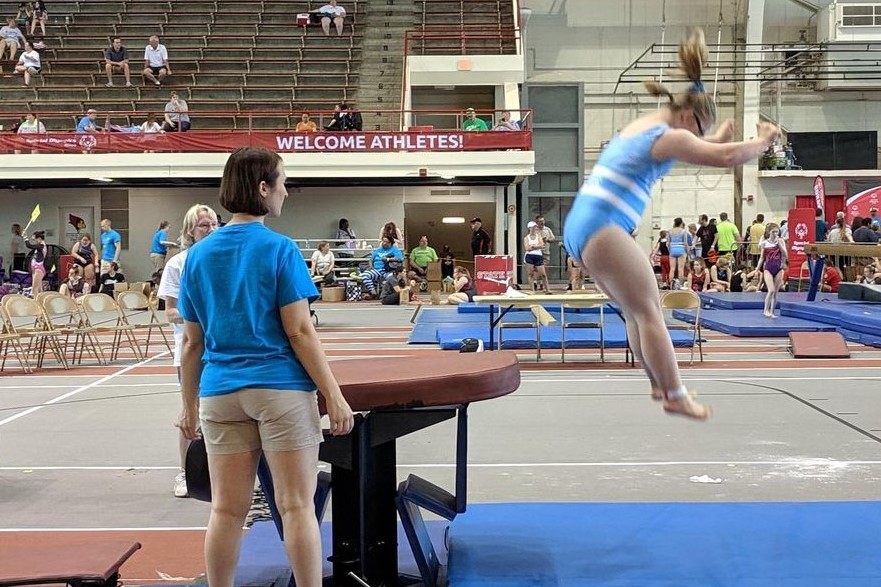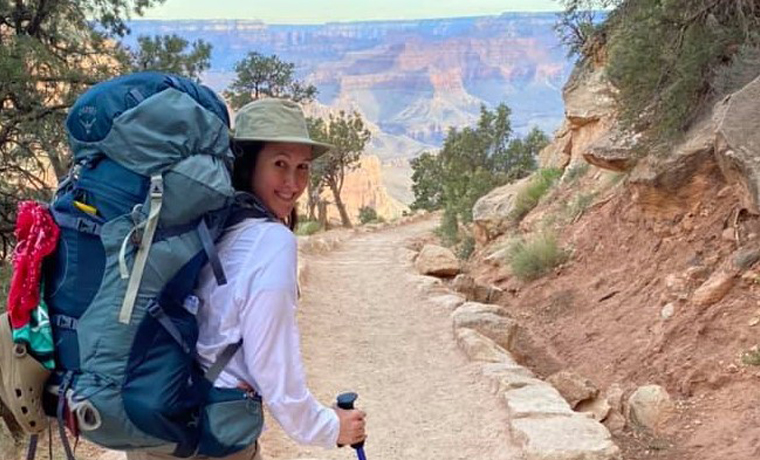At the start of 2020, Melanie K.’s main concern was how her shoulder surgery in July would impact her year. She had no idea the COVID-19 pandemic would threaten even greater limitations. However, Melanie dealt with her obstacles in great form; she provided physical therapy to young clients, coached gymnastics with the Illinois Special Olympics, and maintained her martial arts training. She even took a four-day hike through the Grand Canyon.
PT with the kiddos
Melanie works for the Cahokia School District in Illinois providing physical therapy for up to 30 students, most of whom are below fifth grade. Her “kiddos” often have autism, cerebral palsy, Down syndrome, or developmental delays.
When Cahokia schools closed last March, all of Melanie’s clients switched to virtual sessions. She enlists the aid of a parent during virtual sessions for her very young clients, or those with greater difficulties. She says trying to determine a child’s muscle tone or level of spasticity can be tough when in person yet talking a parent through the process virtually is a whole other challenge.
She and a parent recently waited for a new client’s 45-minute tantrum to conclude before starting a session. The battle of wills happens electronically now, she says, “He doesn’t know me and the only exposure he’s had to me is this tiny little box on the screen.” Melanie must exaggerate her movements for them to translate well via laptop or tablet. She laughs when she thinks about what neighbors might see through her windows.
Melanie can also use videos as a reward or as motivation for some children who struggle to complete a repetitive task, such as the Sit Up Song. In one instance, she had a parent play a video on a phone placed halfway across the room to entice the child to walk in a gait trainer.
Melanie has found that parents may delay development by not letting infants struggle and find their way. When her best friends were concerned about their first child not crawling, she told them, “You haven’t put her down for four months. I know she doesn’t like being on the floor, but that’s how babies learn.”
Gymnastics and Special OIympians
At five years old, Melanie’s mother said it was either gymnastics or ballet as an outlet for her abundant energy; she has been involved with competitive gymnastics ever since. When she could no longer compete, she began judging competitions and coaching. Melanie says, “I got lucky. I fell in love with a sport at five years old and kept loving it.”
About 20 years ago, a friend started a class for girls with special needs at World Class Gymnastics Center in Belleville, Il. and asked Melanie to help coach, thus beginning her involvement with Special Olympics Illinois.

The Special Olympics games were first held in Chicago in 1968 and was created by the Foundation for the Benefit of Persons with Intellectual Disabilities. Melanie loves how inclusive it is, with competitors from all walks of life—regardless of race, nationality, or economic status—who have an intellectual disability. The minimum age to compete is eight years old and there is no upper age limit. Coaches, trainers, officials, event organizers, fundraisers, and managers are volunteers. Athletes decide how involved they want to get in competing.
Special Olympics has a Young Athletes program open to all children ages two to seven, regardless of any disability. Each spring, students in early grades are brought to a high school stadium and have a field day of events that introduces basic sports skills such as running, kicking, and throwing.
Their current team consists of roughly 25 artistic and rhythmic gymnasts; their oldest team member is 35 years old. The older Special Olympics athletes practice along with the gymnastics club team and some may compete in other competitions. Melanie says the club team is extremely supportive—they cheer on their teammates and are eager to volunteer at regional Special Olympics competitions.
During the pandemic, the Special Olympics gymnasts moved to online sessions for stretching, conditioning exercises, and learning choreography. The weekly stretching class is attended by athletes from around the world, including kids from Mexico, Ireland, and Russia. Melanie says a trainer may tell a gymnast, “Alright, go out and run to your tree and come on back as fast as you can. Go!” Melanie was able to join her athletes when they competed in Greece in 2011. Her athletes have also competed in Abu Dhabi (UAE) and Switzerland. In January 2022, one of her athletes will compete in snowshoeing in Russia.
Taking a Grand hike

In 2018, Melanie was up for the challenge when a friend wanted to hike the Grand Canyon and stay at the Phantom Ranch lodge on the Canyon floor. Melanie had been to the Canyon several times but never deep in it.
They had to start planning early. The lodge is so popular, reservations must be won by lottery at least 13 months out. Their plan was to hike for four days in June 2020 from the remote North Rim of the Grand Canyon to the touristy South Rim. The other nights they would camp.
Backcountry permits for camping are required to control the number of people at the campsites and reduce the environmental impact. You submit your application for a permit along with your itinerary, no earlier than three months before you plan to camp.
“We think we’ve got everything ready to go in March,” Melanie says, “COVID happens, and then they’re like we’re shutting the Grand Canyon down. We’ve sunk so much money and time and training into this.”
The canyon did reopen—with further restrictions—by June. The day before they left, however, their hotel on the North Rim closed due to a large wildfire that engulfed the only road to the North Rim. At that point, their plans changed to hiking along the trails of the South Rim.
They flew out on Southwest Airlines. Middle seats were left unsold, and masks were mandatory. The flight was the most nerve-wracking thing about the trip, she says, “That was the first time I had been close to [a stranger] in months at that point.” Melanie was stunned by how few people were at the Canyon. “That was the most empty I’ve ever seen the Grand Canyon,” she said. During their hike, she says she saw about six people because many canceled their reservations. Only two of the many campsites were occupied. While Melanie enjoyed the challenge and hopes to hike the North Rim to the South Rim again, she says her friend plans to ride a mule next time.
Effort and perseverance
Melanie attributes her stamina to regular Tae Kwon Do martial arts classes. The two main principles are effort and perseverance, she says, “Something is going to be bad, and you’re just going to have to learn to deal with it.”
During weeks of shutdown last March and April, Melanie’s instructor quickly converted to virtual classes. Melanie attended every day to give some structure to her day. The studio has since reopened with marked locations for each person, masks required, and temperature checks. Sparring one-on-one with a partner has not returned.
When friends ask Melanie when she will get her black belt, she tells them, “I don’t know, and I don’t care. That’s not the point. I’ll get there eventually.” She tries to teach her PT kiddos that philosophy.